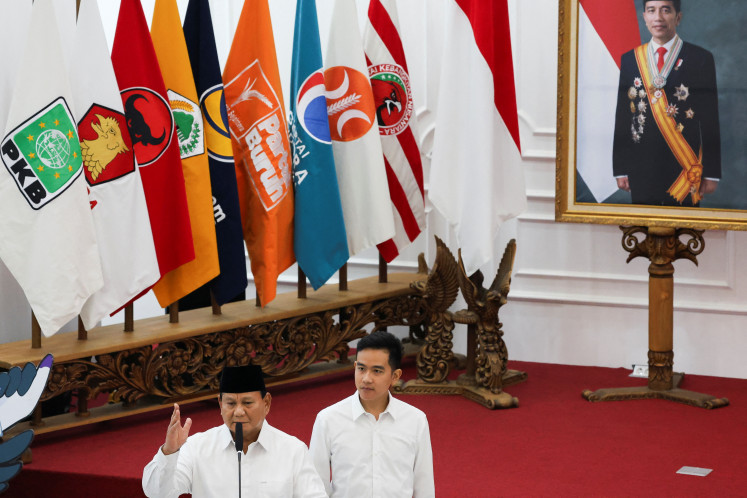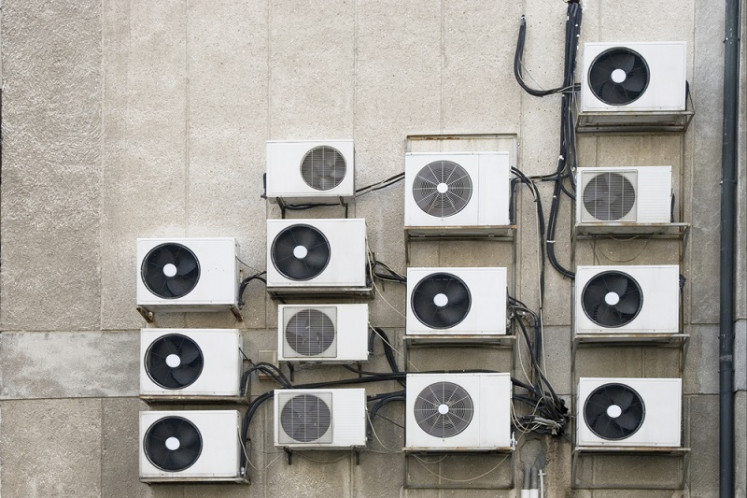Pandemic forces Muslims to forgo Ramadan traditions
Early risers: Teenagers from Tinjomoyo subdistrict, Semarang, Central Java, stage a parade early Sunday morning, during which they played percussion instruments to wake up Muslims for sahur (predawn meal)
Change Size

E
arly risers: Teenagers from Tinjomoyo subdistrict, Semarang, Central Java, stage a parade early Sunday morning, during which they played percussion instruments to wake up Muslims for sahur (predawn meal). Because of the COVID-19 pandemic, less people are conducting such rituals, which have become a tradition for people in the area. (JP/Suherdjoko)
Muslims worldwide began a month of fasting on Friday amid unprecedented social restrictions enforced in response to the COVID-19 pandemic.
For many Muslims in Indonesia, the long-awaited Ramadan involves much more than simply abstaining from food and drink from dawn to dusk.
The holy month brings with it a host of communal traditions, from tarawih (evening Ramadan prayers) at mosques, bukber (breaking-of-the-fast gatherings) with family, friends and colleagues, to sahur (predawn meal) “on the road” and itikaf (seclusion in mosques).
However, the viral outbreak has upended much of the Muslim way of life in the country after the government instructed people to stay at home as the main strategy to curb contagion.
As of Sunday afternoon, the country had confirmed 8,882 COVID-19 cases and 743 deaths, according to the official tally.
Every night during the month of Ramadan, worshippers typically fill up all mosques across the country for tarawih, but the first night this year on Thursday was anything but crowded.
Syarafina Marha, 29, a private sector worker from Bekasi, West Java, said she always tried to go home earlier so that she could take part in the first tarawih at the mosque in her residential compound. Now that the mosque has been forced to close, she has mixed feelings.
“I guess my most-want-to-do item in Ramadan is to perform the tarawih [at the mosque] and the mass Idul Fitri prayers,” she told The Jakarta Post on Friday.
“It is just so sad to realize that now everyone must do it individually. It feels like we aren’t fully experiencing the nuances of Ramadan,” she added.
“But to save myself and other people, we don’t have any option but to follow the rules, right?”
Meanwhile, Muhammad Ellan from South Tangerang, Banten, has not lost hope that this year’s Ramadan will still feel special, as it is the largest religious observance in the Muslim faith.
Ellan, 59, had prayed five times a day for the past year at his local mosque before it was forced to close under the order of the government. He has now become accustomed to praying at home.
“What is more important is to be able to achieve muhasabah [introspection],” he said this week.
The Religious Affairs Ministry recently issued a letter outlining prayer and worship guidelines for Ramadan this year. It instructs Indonesian Muslims to perform the tarawih and tadarus (Quran recitations) at home and urges them not to participate in public bukber or sahur gatherings. Furthermore, any itikaf or Nuzulul Quran (day of the revelation of the Quran) events to be held at mosques are to be canceled.
The nation’s two largest Islamic organizations, Nahdlatul Ulama (NU) and Muhammadiyah, also called on Indonesian Muslims to refrain from public gatherings. Muhammadiyah has been promoting the hashtag #RamadandiRumah (Ramadan at Home) to encourage Muslims to worship at home.
Istiqlal Mosque in Central Jakarta, the largest mosque in Southeast Asia, showed no signs of hosting congregational prayers on Thursday night, a sharp contrast to previous years when the mosque council would serve up to 5,000 portions of takjil (breaking-of-the-fast snacks) to worshipers during Ramadan.
Istiqlal spokesperson Abu Hurairah said it was the first time in history the mosque has been closed since it opened in 1978. However, despite it being a time for social restraint, not all Muslims have heeded the instruction to shelter in place.
Muslims in a number of regions reportedly went ahead with tarawih at mosques, as was the case in Aceh. The Aceh Ulema Council has allowed people to continue performing mass prayers at mosques, so long as they were in areas where COVID-19 had been safely contained.
Mosques in South Jakarta, South Tangerang in Banten, Tegal in Central Java, as well as Tuban and Jombang in East Java also allowed tarawih to be observed, according to local reports.
Syarif Hidayatullah State Islamic University lecturer and researcher Saiful Umam said that Muslim beliefs typically fell within a spectrum of theological arguments ranging from the fatalistic — where one conceives of all events as predetermined — to those who believe that it is ikhtiar (effort) that counts.
Most Indonesians fall somewhere midway between the two extremes but tend to learn toward the latter, making for more law-abiding citizens, Saiful said.









